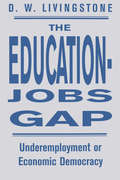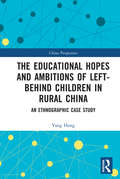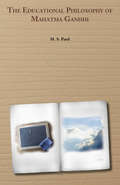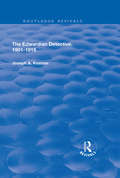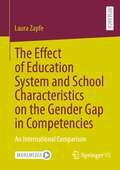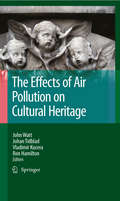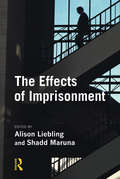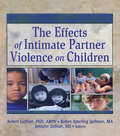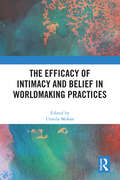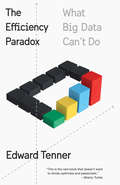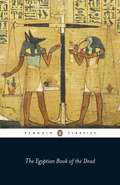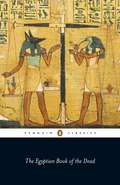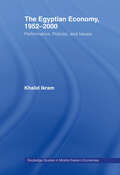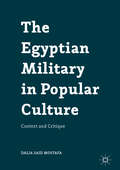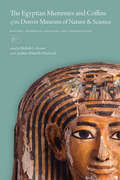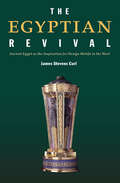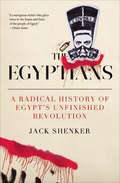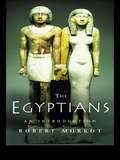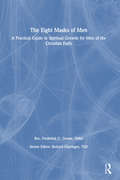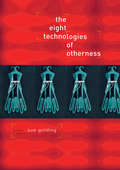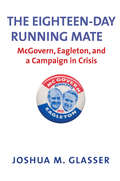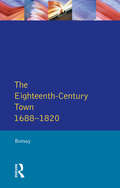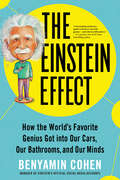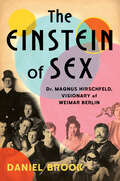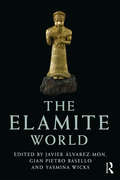- Table View
- List View
The Education-Jobs Gap: Underemployment Or Economic Democracy?
by D W LivingstoneAccording to Ivar Berg's performance criteria, over half of the U.S. workforce is now underemployed. Using analysis based on U.S. and Canadian surveys of work and learning experiences and other documental data, author David Livingstone exposes the myth of the "learning enterprise" and argues that the major problem in education-work relations is not education but the mismatch between work and worker.
The Educational Hopes and Ambitions of Left-Behind Children in Rural China: An Ethnographic Case Study (China Perspectives)
by Yang HongThis monograph highlights the educational experiences of rural children who are 'left behind' by their migrant worker parents in China, analyzing how this situation impacts on their aspirations and self-identity. Via an ethnographic and qualitative case study of a rural school in southwest China, the author presents the real lives of these disadvantaged children along with their challenges and needs, and provides an in depth understanding of how being ‘left behind’ impacts on their future aspirations. Building on the sociological theories of Pierre Bourdieu, the author makes an original contribution by combining seemingly incompatible disciplinary perspectives, such as cultural capital from sociology, rational action from behavioral economics, and self-efficacy from psychology. Hence, the book endeavors to transfer these Western theories to an Eastern context and demonstrates cultural nuances that are not always captured when applied in the West. The book will attract academic scholars and postgraduate students in the area of socially disadvantaged children and young people as well as those who are working on youth studies and rural education.
The Educational Philosophy of Mahatma Gandhi
by M. S. Patel“By education, I mean an all-round drawing out of the best in child and man—body, mind and spirit. Literacy is not the end of education nor even the beginning. It is one of the means whereby man and woman can be educated. Literacy in itself is no education.” … “the aim of education should be to develop to the full the potentialities of every child at school, in accord always with the general good of the community of which he is a member.” M. K. Gandhi
The Edwardian Detective: 1901-15 (Routledge Revivals)
by Professor Joseph KestnerThis title was first published in 1999 & examines the range of detective literature produced between 1901 and 1915 in Britain, during the reign of Edward VII and the early reign of George V. The book assesses the literature as cultural history, with a focus on issues such as legal reform, marital reform, surveillance, Germanophobia, masculinity/femininity, the "best-seller", the arms race, international diplomacy and the concept of "popular" literature. The work also addresses specific issues related to the relationship of law to literature, such as: the law in literature; the law as literature, the role of literature in surveillance and policing; the interpretation of legal issues by literature; the degree to which literature describes and interprets law; the description of legal processes in detective literature; and the connections between detective literature and cultural practices and transitions.
The Effect of Education System and School Characteristics on the Gender Gap in Competencies: An International Comparison
by Laura ZapfeLaura Zapfe’s aim is to explain how education system and school characteristics affect the gender gap in mathematics and reading competencies. She adapts the macro-meso-micro model. At the micro level, she uses theories, e.g., gender-specific socialization, highlighting how gender-specific expectations and stereotypes cause gendered interest and skills and therefore gender differences in mathematics and reading. Deriving a macro-meso-micro link, she explains how education system characteristics such as competition, differentiation, and standardization, and school characteristics could increase or decrease the gender-specific socialization effects, leading to larger or smaller gender gaps in mathematics and reading competencies. On this basis, she performs a cross-national comparison of 78 countries participating in the Programme for International Student Assessment (PISA) 2018, combined with further researched macro data with three-level mixed-effects models. The results show that boys have an advantage in mathematics, girls have an advantage in reading, the gender effects are slightly higher for reading, and the gender effects at the school level are more pronounced than those at the country level.
The Effects of Air Pollution on Cultural Heritage
by Ron Hamilton John Watt Johan Tidblad Vladimir KuceraThis book reviews the sources of the air pollutants responsible for building damage and the mechanisms involved. Studies investigating the relationships between pollution concentration (dose) and the resulting damage (response) are described and the latest research findings for dose-response functions are presented. Trends in pollutant emissions, ambient concentrations and building damage over time are described and future predictions are presented. Methodologies for assessing the extent of the potential problem in a region - the stock at risk - are presented. Procedures for estimating the economic implications are described and the consequences are discussed in detail, because economic factors are important for reaching policy and management decisions at local, national and international scales. Damage to cultural heritage buildings is an important additional effect which needs to be considered as the standards are revised and the factors which will need to be brought into the assessment are presented.
The Effects of Imprisonment (Cambridge Criminal Justice Series)
by Shadd Maruna Alison LieblingAs the number of prisoners in the UK, USA and elsewhere continues to rise, so have concerns risen about the damaging short term and long term effects this has on prisoners. This book brings together a group of leading authorities in this field, both academics and practitioners, to address the complex issues this has raised, to assess the implications and results of research in this field, and to suggest ways of mitigating the often devastating personal and psychological consequences of imprisonment.
The Effects of Intimate Partner Violence on Children
by Robert A. Geffner Robyn Spurling Igelman Jennifer ZellnerLearn how to help children cope with domestic violence! The Effects of Intimate Partner Violence on Children examines the short- and long-term developmental issues facing children exposed to violence in their own homes. The book addresses the growing concern for children at risk of suffering psychological, behavioral, social, and educational problems, and for the effects childhood maltreatment may have on their adult lives. An interdisciplinary panel of researchers, academicians, attorneys, clinicians, and practitioners discuss treatment programs, theoretical perspectives, research and methodological issues, assessment and intervention, and forensic issues, including child custody. The Effects of Intimate Partner Violence on Children addresses the emotional and behavioral disturbances children can suffer after being exposed to violence between their parents. It examines methodological and theoretical challenges, pilot programs for treatment, intervention models, therapeutic curricula, and family law. Practitioners and academics review dozens of studies, representative samples, probability samples, and research findings relating to children's internalizing and externalizing behaviors, adjustment difficulties, coping strategies. The book also examines: the association between emotional regulation and emotionality and marital and parent-child conflict in terms of children's adjustment and physical health how the experience of mothers in low-income families suffering severe physical abuse relates to children's behavior problems. how father-to-mother aggression reduces children's affinity with their parents problems of service delivery for battered mothers Canadian legislation involving wife abuse and child custody the well-being of families accessing treatment group interventions implemented in family agency and school settings how to develop interagency protocols and much more! The Effects of Intimate Partner Violence on Children is an essential resource for professionals, advocates, and practitioners who work with abused children and maltreating families.
The Efficacy of Intimacy and Belief in Worldmaking Practices
by Urmila MohanThis book explores ‘efficacious intimacy’ as an embodied concept of worldmaking, and a framework for studying belief practices in religious and political domains. The study of how beliefs make and manifest power through their sociality and materiality can reveal who, or what, is considered effective in a particular socio-cultural context. The chapters feature case studies drawn from diverse religious and political contexts in Asia, Africa, and the Americas, and explore practices ranging from ingesting sacred water to resisting injustice. In doing so, the authors analyze emotions and affects, and how they influence dynamics of proximity and distance. Taking an innovative approach to the topic of intimacy, the book offers a fascinating examination of how life-worlds are constructed by material practices. It will be of interest to scholars of anthropology, religion, and material culture.
The Efficiency Paradox: What Big Data Can't Do
by Edward TennerA bold challenge to our obsession with efficiency--and a new understanding of how to benefit from the powerful potential of serendipityAlgorithms, multitasking, the sharing economy, life hacks: our culture can't get enough of efficiency. One of the great promises of the Internet and big data revolutions is the idea that we can improve the processes and routines of our work and personal lives to get more done in less time than we ever have before. There is no doubt that we're performing at higher levels and moving at unprecedented speed, but what if we're headed in the wrong direction?Melding the long-term history of technology with the latest headlines and findings of computer science and social science, The Efficiency Paradox questions our ingrained assumptions about efficiency, persuasively showing how relying on the algorithms of digital platforms can in fact lead to wasted efforts, missed opportunities, and above all an inability to break out of established patterns. Edward Tenner offers a smarter way of thinking about efficiency, revealing what we and our institutions, when equipped with an astute combination of artificial intelligence and trained intuition, can learn from the random and unexpected.
The Egyptian Book of the Dead
by John Romer Wallace BudgeA unique collection of funerary texts from a wide variety of sources, dating from the 15th to the 4th century BC. Consisting of spells, prayers and incantations, each section contains the words of power to overcome obstacles in the afterlife. The papyruses were often left in sarcophagi for the dead to use as passports on their journey from burial, and were full of advice about the ferrymen, gods and kings they would meet on the way. Offering valuable insights into ancient Egypt, The Book of the Dead has also inspired fascination with the occult and the afterlife in recent years.
The Egyptian Book of the Dead: The Papyrus Of Ani
by John RomerThe Book of the Dead is a unique collection of funerary texts from a wide variety of sources, dating from the fifteenth to the fourth century BC. Consisting of spells, prayers and incantations, each section contains the words of power to overcome obstacles in the afterlife. The papyruses were often left in sarcophagi for the dead to use as passports on their journey from burial, and were full of advice about the ferrymen, gods and kings they would meet on the way. Offering valuable insights into ancient Egypt, The Book of the Dead has also inspired fascination with the occult and the afterlife in recent years.
The Egyptian Economy, 1952-2000: Performance Policies and Issues (Routledge Studies in Middle Eastern Economies)
by Khalid IkramInterviews with former Prime Ministers and Cabinet Ministers along with previously unpublished analysis by the World Bank, IMF and USAID provide entertaining and interesting insights into Egypt's economic development policy during 1952 to 2000. Areas addressed include:* the performance of the Egyptian economy since 1950s* the factors that have facilitated or retarded economic performance* the Egyptian authorities approach to economic issues and policy-making * the chief questions that policy-makers will have to deal with in the next twenty years. Set apart by Khalid Ikram’s intimate knowledge of the Egyptian policy-makers this book presents a unique account of economic development and policy-making in Egypt during 1952 to 2000.
The Egyptian Military in Popular Culture
by Dalia Said MostafaThis book examines a key question through the lens of popular culture: Why did the Egyptian people opt to elect in June 2014 a new president (Abdel Fattah al-Sisi), who hails from the military establishment, after toppling a previous military dictator (Hosni Mubarak) with the breakout of the 25 January 2011 Revolution? In order to dissect this question, the author considers the complexity of the relationship between the Egyptian people and their national army, and how popular cultural products play a pivotal role in reinforcing or subverting this relationship. The author takes the reader on a 'journey' through crucial historical and political events in Egypt whilst focusing on multi-layered representations of the 'military figure' (the military leader, the heroic soldier, the freedom fighter, the conscript, the martyred soldier, and the Intelligence officer) in a wide range of popular works in literature, film, song, TV drama series, and graffiti art. Mostafa argues that the realm of popular culture in Egypt serves as the 'blood veins' which feed the nation's perception of its Armed Forces.
The Egyptian Mummies and Coffins of the Denver Museum of Nature & Science: History, Technical Analysis, and Conservation
by Michele L. Koons Caroline Arbuckle MacLeodIn the 1970s and 1980s, the Denver Museum of Nature & Science acquired two ancient Egyptian mummies and three coffins. The mummies are the remains of two women who lived in an unknown locale in ancient Egypt. They both died in their thirties and have now been subjected to a number of unpublished scientific and unscientific analyses over the years. In 2016, as DMNS prepared to update its Egyptian Hall, staff scientists decided to reexamine the mummies and coffins using innovative, inexpensive, and accessible techniques. This interdisciplinary volume provides a history of the mummies’ discovery and relocation to Colorado. It guides the reader through various analytical techniques, detailing past research and introducing new data and best practices for future conservation efforts. The new analysis includes more accurate radiocarbon dating, fully comprehensive data from updated CT scans, examples of Egyptian blue and yellow pigments on the coffins uncovered by non-invasive x-ray fluorescence, unprecedented analysis of the coffin wood, updated translations and stylistic analysis of the text and imagery on the coffins, gas chromatography of the paints and resins, linen analysis, and much more. The Egyptian Mummies and Coffins of the Denver Museum of Nature & Science provides replicable findings and consistent terminology for institutions performing holistic studies on extant museum collections of a range of material types. It will add substantially to what we know about the effective conservation of Egyptian mummies and coffins. Contributors: Christopher H. Baisan, Hans Barnard, Bonnie Clark, Pearce Paul Creasman, Farrah Cundiff, Jessica M. Fletcher, Kari L. Hayes, Kathryn Howley, Stephen Humphries, Keith Miller, Vanessa Muros, Robyn Price, David Rubinstein, Judith Southward, Jason Weinman
The Egyptian Revival: Ancient Egypt as the Inspiration for Design Motifs in the West
by James Stevens CurlIn this beautifully illustrated and closely argued book, a completely updated and much expanded third edition of his magisterial survey, Curl describes in lively and stimulating prose the numerous revivals of the Egyptian style from Antiquity to the present day. Drawing on a wealth of sources, his pioneering and definitive work analyzes the remarkable and persistent influence of Ancient Egyptian culture on the West. The author deftly develops his argument that the civilization of Ancient Egypt is central, rather than peripheral, to the development of much of Western architecture, art, design, and religion. Curl examines: the persistence of Egyptian motifs in design from Graeco-Roman Antiquity, through the Medieval, Baroque, and Neo-Classical periods rise of Egyptology in the nineteenth and twentieth-century manifestations of Egyptianisms prompted by the discovery of Tutankhamun’s tomb various aspects of Egyptianizing tendencies in the Art Deco style and afterwards. For students of art, architectural and ancient history, and those interested in western European culture generally, this book will be an inspiring and invaluable addition to the available literature.
The Egyptians: A Radical History of Egypt's Unfinished Revolution
by Jack ShenkerThe award-winning journalist and longtime Cairo resident delivers a &“meticulous, passionate study&” of the ongoing battle for contemporary Egypt (The Guardian). On January, 25, 2011, a revolution began in Egypt that succeeded in ousting the country&’s longtime dictator Hosni Mubarak. In The Egyptians, journalist Jack Shenker uncovers the roots of the uprising and explores the country&’s current state, divided between two irreconcilable political orders. Challenging conventional analyses that depict a battle between Islamists and secular forces, The Egyptians illuminates other, equally important fault lines: far-flung communities waging war against transnational corporations, men and women fighting to subvert long-established gender norms, and workers dramatically seizing control of their own factories. Putting the Egyptian revolution in its proper context as an ongoing popular struggle against state authority and economic exclusion, The Egyptians explains why the events since 2011 have proved so threatening to elites both inside Egypt and abroad. As Egypt&’s rulers seek to eliminate all forms of dissent, seeded within the rebellious politics of Egypt&’s young generation are big ideas about democracy, sovereignty, social justice, and resistance that could yet change the world. &“I started reading this and couldn&’t stop. It&’s a remarkable piece of work, and very revealing. A stirring rendition of a people&’s revolution as the popular forces that Shenker vividly depicts carry forward their many and varied struggles, with radical potential that extends far beyond Egypt.&” —Noam Chomsky
The Egyptians: An Introduction (Peoples of the Ancient World)
by Robert MorkotA widely published author on the subject, Robert Morkot presents a clear introduction to the origins, history and culture of Ancient Egyptian civilization. This excellent addition to the popular family of books on ancient peoples offers a broad coverage of Egyptian life. Morkot also addresses a number of important questions dealing with race and colour, Egypt's relationship with Africa and Egypt's legacy. The Egyptians includes chapters on: dynasties and empires society daily life religion art and architecture languages and literature. This engaging and accessible book provides students with the ideal introduction to this fascinating civilization.
The Eight Masks of Men: A Practical Guide in Spiritual Growth for Men of the Christian Faith
by Richard L Dayringer Frederick GrosseIn today's rapidly changing society, the rules you learned as a child may no longer apply, causing you to experience restlessness and confusion. The Eight Masks of Men: A Practical Guide in Spiritual Growth for Men of the Christian Faith will encourage you to come out from behind your mask of solitude and loneliness--one of man's most obtrusive masks--and reach out for help and community. By answering questions commonly asked by men of various religious and personal backgrounds, this book will help you tune into your feelings, innermost thoughts, and that void you feel inside. As you become consciously aware of how the eight masks are a part of your being, you will recognize the true gift beneath each one.The Eight Masks of Men is the first book to combine historical, theological, and sociological perspectives with a practical approach for personal growth. To help you divest yourself of your inhibitions and experience inner harmony, it blends personal stories, humorous anecdotes, biblical research, and clinical information. The eight masks that men wear and what they hide that author Rev. Dr. Frederick G. Grosse explores include:mask: loneliness; hides: desire for communitymask: rage and anger; hide: pain and hurtmask: compulsion; hides: desire for lovemask: performance; hides: desire for acceptancemask: control; hides: desire for friendshipmask: producing; hides: desire to just “be”mask: competition; hides: desire for humilitymask: institutional religion; hides: desire for spiritual growthDon't let tragedy or desperation strike before you commit to building a healthier relationship with yourself, the people important to you, and God. Men who feel out of touch with their spiritual sides, retreat and spiritual direction leaders, pastoral counselors, chaplains, marriage and family counselors, and members of the clergy will find in The Eight Masks of Men the inspiration and insight they need to guide themselves and one another to a season of union with God.
The Eight Technologies of Otherness
by Dr Sue Golding Sue GoldingThe Eight Technologies of Otherness is a bold and provocative re-thinking of identities, politics, philosophy, ethics, and cultural practices. In this groundbreaking text, old essentialism and binary divides collapse under the weight of a new and impatient necessity. Consider Sue Golding's eight technologies: curiosity, noise, cruelty, appetite, skin, nomadism, contamination, and dwelling. But why only eight technologies? And why these eight, in particular? Included are thirty-three artists, philosophers, filmmakers, writers, photographers, political militants, and 'pulp-theory' practitioners whose work (or life) has contributed to the re-thinking of 'otherness,' to which this book bears witness, throw out a few clues.
The Eighteen-Day Running Mate
by Joshua M. GlasserNo skeletons were rattling in his closet, Thomas Eagleton assured George McGovern’s political director. But only eighteen days later—after a series of damaging public revelations and feverish behind-the-scenes maneuverings—McGovern rescinded his endorsement of his Democratic vice-presidential running mate, and Eagleton withdrew from the ticket. This fascinating book is the first to uncover the full story behind Eagleton's rise and precipitous fall as a national candidate. Within days of Eagleton's nomination, a pair of anonymous phone calls brought to light his history of hospitalizations for “nervous exhaustion and depression” and past treatment with electroshock therapy. The revelation rattled the campaign and placed McGovern's organization under intense public and media scrutiny. Joshua M. Glasser investigates a campaign in disarray and explores the perspectives of the campaign’s key players, how decisions were made and who made them, how cultural attitudes toward mental illness informed the crisis, and how Eagleton's and McGovern's personal ambitions shaped the course of events. Drawing on personal interviews with McGovern, campaign manager Gary Hart, political director Frank Mankiewicz, and dozens of other participants inside and outside the McGovern and Eagleton camps—as well as extensive unpublished campaign records—Glasser captures the political and human drama of Eagleton's brief candidacy. Glasser also offers sharp insights into the America of 1972—mired in war and anxious about the economy, a time with striking similarities to our own.
The Eighteenth-Century Town: A Reader in English Urban History 1688-1820 (Readers In English Urban History)
by Peter BorsayThe eighteenth century represents a critical period in the transition of the English urban history, as the town of the early modern era involved into that of the industrial revolution; and since Britain was the 'first industrial nation', this transformation is of more-than-national significance for all those interested in the histroy of towns. This book gathers together in one volume some of the most interesting and important articles that have appeared in research journals to provide a rich variety of perspectives on urban evelopment in the period.
The Einstein Effect: How the World's Favorite Genius Got into Our Cars, Our Bathrooms, and Our Minds
by Benyamin Cohen"A fascinating and funny guide to history's favorite genius—and why he still matters." —A.J. Jacobs, New York Times bestselling authorA fascinating look into how Einstein's genius and science continues to show up in so many facets of our everyday lives and his enduring legacy as an unlikely pop culture icon.Albert Einstein was the first modern-day celebrity and, decades after his death, still has the world's most recognizable face. His influence is seen in much of the technology we use every day: GPS, remote controls, weather forecasts, even toothpaste. But it's not just Einstein's scientific discoveries that continue to shape our world. His legacy underpins the search for aliens, the rescue of refugees, the invention of time machines, and the debunking of fake news. He appears in new books, TV shows, and movies all the time—and fans are paying millions for Einstein relics at auction.Award-winning author and journalist Benyamin Cohen has a bizarre side hustle as the manager of Einstein's official social media accounts, which have 20 million followers—more than most living celebrities. In The Einstein Effect, Cohen embarks on a global quest to unearth Einstein's ongoing relevance today. Along the way, he meets scientists and celebrities, speaks to dozens with the last name Einstein (including two rabbis), and even tracks down the brain of Einstein, stolen from his body during the autopsy. Cohen shows us the myriad ways the Nobel Prize winner's influence is still with us, giving an in-depth—and often hilarious—look at the world's favorite genius like you've never seen him before.Praise for The Einstein Effect:"Benyamin is a regular Joe with great humility, a tremendous sense of humor, a philosopher with an acute awareness of human connection, a gift to us all." —Mandy Patinkin, actor, singer, activist"I hope this book encourages others to be inspired by Einstein as well." —Christopher Lloyd, award-winning actor"A book for geniuses and the rest of us alike." —Derek Baxter, author of In Pursuit of Jefferson"A thoroughly entertaining new book." —Jeff Einstein, great-great nephew of Albert Einstein"Full of humor and surprises." —Paul Halpern, physics professor and author of Einstein's Dice and Schrödinger's Cat
The Einstein of Sex: Dr. Magnus Hirschfeld, Visionary of Weimar Berlin
by Daniel BrookAn illuminating portrait of a lost thinker, German-Jewish sexologist and activist Magnus Hirschfeld. More than a century ago, Dr. Magnus Hirschfeld, dubbed the “Einstein of Sex,” grew famous (and infamous) for his liberating theory of sexual relativity. Today, he’s been largely forgotten. Journalist Daniel Brook retraces Hirschfeld’s rollicking life and reinvigorates his legacy, recovering one of the great visionaries of the twentieth century. In an era when gay sex was a crime and gender roles rigid, Hirschfeld taught that each of us is their own unique mixture of masculinity and femininity. Through his public advocacy for gay rights and his private counseling of patients toward self-acceptance, he became the intellectual impresario of Berlin’s cabaret scene and helped turn his hometown into the world’s queer capital. But he also enraged the Nazis, who ransacked his Institute for Sexual Science and burned his books Driven from his homeland, Hirschfeld traveled to America, Asia, and the Middle East to research sexuality on a global scale. Through his harrowing lived experience of antisemitic persecution and a pivotal late-in-life interracial romance, he came to see that race, like gender, was a human invention. Hirschfeld spent his final years in exile trying to warn the world of the genocidal dangers of racism. Rich in passion and intellect, The Einstein of Sex at last brings together this unsung icon’s work on sexuality, gender, and race and recovers the visionary who first saw beyond the binaries. A century after his groundbreaking work—as the fights for personal freedom and societal acceptance rage on—Hirschfeld’s gift for thinking beyond the confines of his world has much to teach us
The Elamite World (Routledge Worlds)
by Javier Álvarez-Mon Gian Pietro Basello Yasmina WicksAmongst the civilizations to participate in the dynamic processes of contact and interchange that gave rise to complex societies in the ancient Near East, Elam has remained one of the most obscure, at times languishing in the background of scholarly inquiry. In recent years, however, an increasing body of academic publications have acknowledged its relevance and suggested that its legacy was more considerable and long-lasting than previously estimated. The Elamite World assembles a group of 40 international scholars to contribute their expertise to the production of a solid, lavishly illustrated, English language treatment of Elamite civilization. It covers topics such as its physical setting, historical development, languages and people, material culture, art, science, religion and society, as well as the legacy of Elam in the Persian empire and its presence in the modern world. This comprehensive and ambitious survey seeks for Elam, hardly a household name, a noteworthy place in our shared cultural heritage. It will be both a valuable introductory text for a general audience and a definitive reference source for students and academics.
